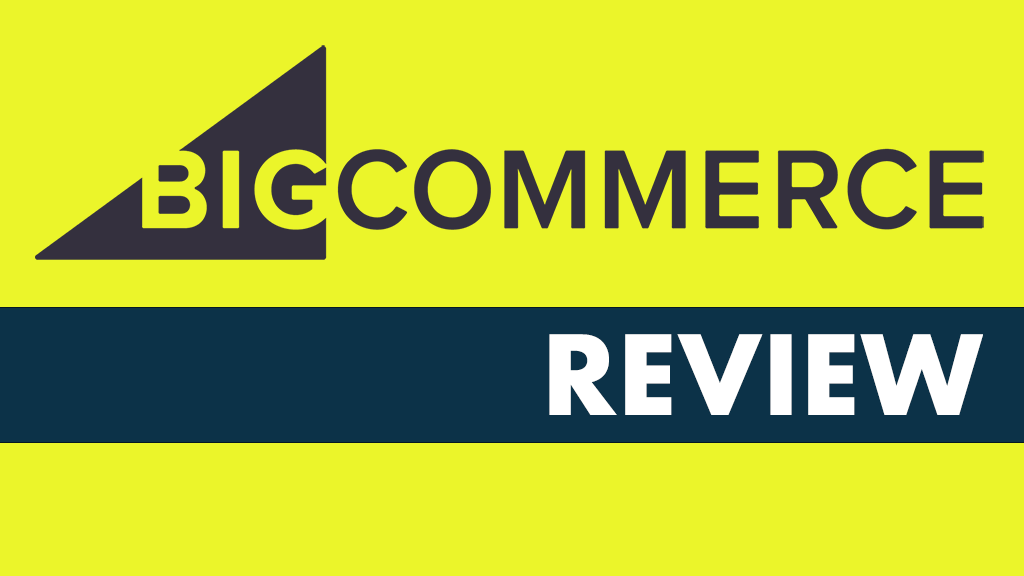BigCommerce Review 2024
Our Research
As a software-as-a-service (SaaS) hosted platform, you will use BigCommerce’s servers and pay for the software each month or year, rather than owning the software and hosting the site on your own server. For many small business owners, the entry-level Standard Plan will provide almost everything they need to run their e-commerce site.
One key missing feature of the Standard plan is the abandoned cart feature. This feature is helpful because it allows shop owners to email reminders to customers who didn’t complete an online sale and capture potential sales. To get this feature, you’ll need to upgrade to the Plus plan or beyond.
BigCommerce’s Standard plan has a trailing 12-month sales limit of $50,000. If you exceed this amount, you’ll be bumped up to the Plus plan with a sales limit of $180,000. The Pro plan costs allow up to $400,000 in annual sales.
BigCommerce Pros & Cons
Pros
- Well-rounded entry-level plan
- Drag-and-drop website builder
- Large number of product options can be used
- Blogging and SEO tools
- Strong reporting functionality
Cons
- No abandoned cart feature with Standard plan
- Limited number of free themes included
- Limited options to customize content without paying extra
BigCommerce at a Glance 9.8 Editor Score
Features & Integrations
9.7
Security Features
9.9
Ease Of Use
9.8
Pricing & Packages
9.7
Customer Service
9.7
9.8 Editor Score
How do I know I can trust this BigCommerce review?
TopRatedTen.com authors, contributors, and editors are serious about research. We combine our own experience with the services we recommend, with reviews that come from verified users–just like you! Together, with reviews from industry experts, we find the Top 10 best products and services to make sure you can choose with confidence and ease.
Overview
With an easy-to-use interface and feature-rich but affordable pricing options, BigCommerce is ideal for small businesses and new online shop owners. Its Standard plan starts at $29 per month and it offers a plethora of key features without charging transaction fees.
In this article, we’ll discuss the pros and cons of this e-commerce platform and compare it to two of its main competitors: Shopify and Squarespace.
BigCommerce Features
Customization
When it comes to the actual site design of your Ecommerce storefront, BigCommerce has its own strengths and weaknesses. First off, there’s no denying that BigCommerce has an incredibly easy-to-use site building system in place.
With an intuitive interface and an appreciation for simplicity, this company fully understands that most of its clients are Ecommerce retailers – not masters of HTML and CSS coding.
Still, it’s important to recognize where this service struggles. While there are plenty of professional templates to choose from, some of those templates are not fully responsive—meaning they may not display properly on mobile devices with smaller screens.
Don’t let that scare you, though. BigCommerce does support HTML and CSS coding. The design editor gives you full control over the visual customization of your site. You won’t be able to customize the functionality though, as BigCommerce doesn’t allow for the editing of PHP or the code used for actual shopping cart functionality. You can layer in functions, it just takes a little knowledge or you’ll need to hire a developer.
Payment Processing
When you’re managing an Ecommerce store, it’s safe to assume that your customers are all going to have different ways of paying you. Choosing the right site builder for your business is all about determining what kind of payment options you need.
BigCommerce may have been designed with small businesses in mind, but that doesn’t mean it doesn’t give you enterprise-level support. With access to PayPal, Stripe, and Authorize.net, it’s no surprise that BigCommerce is considered to have one of the most well-rounded payment solutions in the Ecommerce market.
As if that wasn’t enough, BigCommerce also happens to be the only Ecommerce platform to date that has PayPal One Touch built-in. Essentially, that lets you offer an instant checkout to the more than 100 million PayPal shoppers. Not only does this increase conversions, but it proves that BigCommerce takes efficient payment integration seriously.
SEO Tools
When it comes to digital marketing, SEO happens to be one of the most underappreciated (and complex) techniques to turn potential customers into paying ones. Understandably, most budding Ecommerce retailers would prefer to have a simplified SEO solution.
With BigCommerce you can control the permalinks for your individual product pages and site content. You also have control over title and meta elements. The themes are all designed to load quickly as well, so that site speed won’t create a ranking problem for your online store.
The native SEO features end there but there is an extensive app marketplace within BigCommerce where you may be able to find apps to help with your search optimization, including scoring your current efforts.
Pricing and Value
BigCommerce offers three plans for small businesses, with pricing that scales with the additional features. BigCommerce’s typical plans range from $29 to $299 per month. There is also an Enterprise option available for companies that want to manage multiple storefronts and access to the software’s application programming interface (API). Contact the BigCommerce sales department for more details on this option.
Features
Features vary depending on the plan you choose, but the following are a few of the core features that are included in every plan:
- 12 free templates
- Default integration with PayPal
- Unlimited goods and services
- Unlimited accounts for staff
- Blogging and SEO tools
- Reporting functions
The abandoned cart feature—which allows you to email reminders to customers who haven’t completed their sale—isn’t available with the Standard plan. If you want this feature, you’ll need to purchase the Plus or Pro plan.
You can get started with Shopify by taking advantage of its introductory offer, which includes a three-day free trial plus your first three months at $1 per month. After that, you’ll need to purchase a plan.
BigCommerce Pricing
| Standard | Plus | Pro | |
|---|---|---|---|
| Monthly price | $39 | $105 | $399 |
| Monthly price if paid annually | $29 | $79 | $299 |
| Annual sales limit | Up to $50,000 | Up to $180,000 | Up to $400,000 |
| Best for | Individuals | Small businesses | Growing businesses |
| Abandoned cart saver | X | ✔ | ✔ |
| Google customer reviews | X | X | ✔ |
| Multi-storefront support | X | X | X |
| Customer support | Available 24/7 | Available 24/7 | Available 24/7 |
Fees and Currencies
BigCommerce doesn’t charge transaction fees. Instead, you will need to pay credit card processing fees to your chosen provider. Square and Stripe are two of the biggest names in the business, and neither of them charges a monthly fee. Instead, you pay a flat rate + percentage on each transaction.
BigCommerce also supports multiple currencies, which is helpful if you plan to process sales internationally.
Reporting Functionality
BigCommerce offers a number of key reports in every plan, including customer reports, sales reports, finance reports and marketing reports. There are also tools to improve your SEO. And if BigCommerce doesn’t natively cover a dataset that you want information on, there is a vast app library that will allow you to integrate with third-party software that does.
Secure Hosting
Having an impressive storefront might be exciting for your customers, but as an Ecommerce retailer, stability and security should be the thing that excites you. Once you look past all of the bells and whistles, it’s crucial to determine how safe your data is.
Fortunately, BigCommerce put just as much effort into its security as it does into its website design. When it comes to uptime, BigCommerce boasts a 99.99% average uptime (compared to the industry average of 99.5%). Historically, it has managed to deliver 100% availability during Cyber Week. With each store protected by layers of perimeter and server-specific firewalls, file integrity scanners and intrusion detection software, it’s clear that BigCommerce cares about keeping your data safe as much as you do.
Hosted stores are automatically set up under BigCommerce’s native secure socket layer (SSL). Once you set up your own domain you can integrate your own SSL certificate to keep customer data encrypted.
Customer Support Services
As any experienced Ecommerce retailer can tell you, it’s just a matter of time before you encounter a problem with or have a question about your site. There are just too many variables and moving parts for everything to go smoothly 24/7.
BigCommerce certainly delivers in that department. With a 24/7 support team that can be reached by phone, email and live saveable chat, BigCommerce makes sure that you’re covered no matter what time disaster strikes.
The site also offers access to help articles and tutorials so you can try to troubleshoot issues on your own if you’re comfortable enough to try and tackle them before calling support.
Seamless Integration and Migration Tools
The latest exciting feature in BigCommerce’s toolbox is the ability to integrate with existing Ecommerce platforms. This migration feature provides impressive benefits, and makes this platform the first of its kind to natively support Amazon selling. Merchants are no longer faced with having to pick their favorite Ecommerce platform provider. Thanks to this tool, users can simultaneously list products on their branded BigCommerce site as well as Amazon, Ebay, and Facebook storefronts. Amazon Ecommerce merchants can integrate with the BigCommerce platform, giving them the power to customize their storefront with the Ecommerce website builder, yet still maintain the benefits of having their products listed with Amazon, Pinterest, Facebook or eBay.
Another major benefit of this new tool is the reduction in the risk of shopping cart abandonment. Thanks to synchronized inventory tracking, the correct stock levels are displayed across all storefronts. By controlling stock levels from a single location, you stop customers from discovering part-way through their order that the product has already been sold on another site. Integrated inventory tracking across your BigCommerce, Amazon, Ebay, and Facebook storefronts means you can control and display the same inventory, and manage it all from a single, cloud-based interface.
As with all AI tools, Shopify Magic’s suggestions may not be 100% on target, but they can still shorten the time it takes you to develop compelling product descriptions for your website.
BigCommerce's Buy Button Feature
From marketing your products on Instagram to enhancing your blog site with more commerce options, BigCommerce’s new buy button feature makes online shopping a breeze for everyone—from business owners straight down to their customers.
Buy buttons offer both consumers and sellers a lot more than a simple link ever could. For example, while a link will bring a customer to a specified product or landing page, your BigCommerce buy button can be used to:
- Easily embed a direct path to your checkout page
- Reach customers on a variety of platforms
- Provide a new, more engaging format for the NOW generation of shoppers
- Customize your sales funnel
- Google Analytics-linked
Scalability
BigCommerce helps owners who want to expand their store by offering hundreds of single-click integrations with first-class software. Seamlessly use pre-built integrations by connecting platforms such as Listrak, Bronto, NetSuite and many others that are designed specifically for growing businesses.
BigCommerce Enterprise was launched in 2015 for high-volume retailers, and features advanced security, real-time analytics and much more. Business owners can easily evaluate customer purchasing behaviors, learn to optimize inventory and merchandising and evaluate marketing campaign performances in real time – all necessary tools for scaling a business.
BigCommerce Top Alternatives
| BigCommerce | Shopify | Squarespace | |
|---|---|---|---|
| Pricing | $29 to $299 per month (annually) | $29 to $299 per month (annually) | $16 to $49 per month for Advanced Commerce |
| Features | Unlimited number of products and servicesUnlimited bandwidthUnlimited accounts for staffMulticurrency salesPoint-of-sale functionalityDrag-and-drop interfaceReport functionality24/7 tech support | Unlimited number of products and servicesUnlimited bandwidthUnlimited accounts for staffMulticurrency salesPoint-of-sale functionalityDrag-and-drop interface | Unlimited number of products and servicesUnlimited bandwidthUnlimited accounts for staffMulticurrency salesDrop-and-drag interface |
| Additional Fees | No transaction fee | Up to 2% transaction fee | No additional transaction fees on Commerce plans |
A key differentiator between BigCommerce and two of its main competitors—Shopify and Squarespace—is that BigCommerce lacks the abandoned cart feature with its entry-level plan and it offers a limited number of free templates to build your site. If you want additional templates, they can cost between $150 and $400. Shopify and Squarespace, in contrast, offer a wide array of free templates to build your website with.
BigCommerce doesn’t natively charge transaction fees and it has advanced reporting functions with its Standard plan, whereas Shopify charges a 0.5% to 2% transaction fee if you use a third-party payment processor and requires a more expensive plan to create detailed reports. Squarespace doesn’t offer advanced analytics on its most basic plan.
All three platforms are user-friendly, with a straightforward interface and a drag-and-drop website builder.
Conclusion
BigCommerce is a reputable and feature-rich Ecommerce platform that has grown to become one of the largest providers in the industry. Its rates are competitive and it provides everything a startup or growing online business needs to attract and retain customers.
Is BigCommerce Right for You or Your Business?
With an affordable entry-level plan that’s packed with features, BigCommerce is a great option for small businesses and new shop owners. It’s an excellent choice for those that already use a third-party payment processor and want to keep it.




